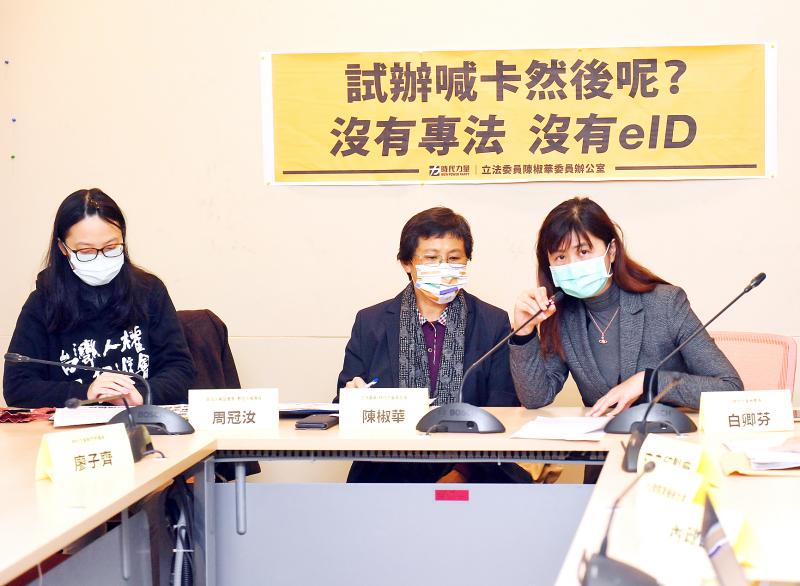The government should hold a public hearing on the issuance of electronic identification cards (eIDs) and stipulate a specific law to regulate them before requiring people to replace their paper identification cards with them, the New Power Party (NPP) said yesterday.
The eIDs would combine the functions of an identification card with those of a Citizen Digital Certificate, the Ministry of the Interior has said.
The ministry was scheduled this month to allow residents in Hsinchu City to switch to eIDs as a trial before issuing them nationwide. However, the Hsinchu City Government halted the trial on the grounds that it needs to protect its residents’ information.

Photo: CNA
To dismiss public concerns over potential information security breaches, the ministry said that the government would only issue eIDs nationwide when it is fully prepared to handle security issues.
The mandate to switch to eIDs could be against the Constitution, New Power Party Legislator Chen Jiau-hua (陳椒華) told a media conference, adding that the policy would be executed on a weak legal basis.
Countries such as Estonia, Germany and Japan have specific laws covering the enforcement of their eID policies, but the ministry insisted on using the House Registration Act (戶籍法) as the basis for implementing such a policy, Chen said.
This shows that the ministry lacks awareness about information security and the legal implications that could arise after the policy is executed, Chen said, adding that the government should stipulate a specific law to regulate the use of data on eIDs and host a public hearing as soon as possible to compile opinions on the policy from all parties.
Discussions at the hearing should also be shared with the public, Chen added.
If the government insists on enforcing the policy, it should clearly inform the public of the risks of using eIDs, as well as ways of protecting themselves from information security breaches.
Chou Kuan-ju (周冠汝), who specializes in human rights issues in the digital age at the Taiwan Association for Human Rights, said that a specific law would prevent the government from frivolously collecting personal data using the eIDs.
An independent agency should also be established to thoroughly enforce the law, Chou said.
As people cannot choose to not switch to eIDs and have to bear the risks themselves, the ministry should re-evaluate the necessity of enforcing such a policy, respect people’s rights on how their data are used and give people the option of switching to a chipless identification card, Chou said.
Central Engraving and Printing Plant vice president Yu Jiu-sheng (喻家聲) said that its personnel and facilities received ISO-27001 and BS10012 certifications to prepare for the trial this month.
Chips that are to be implanted in the eIDs would be handled based on high standards set by the ministry, Yu said, adding that all chips delivered to the plant would be locked and data cannot be stored on them.

The Ministry of Economic Affairs has fined Taobao NT$1.2 million (US$36,900) for advertisements that exceeded its approved business scope and ordered the Chinese e-commerce platform to make corrections in the first half of this year or its license would be revoked. Lawmakers have called for stricter supervision of Chinese e-commerce platforms and more stringent measures to prevent China from laundering its goods through Taiwan as US President Donald Trump’s administration cracks down on origin laundering. The legislature’s Finance Committee yesterday met to discuss policies to prevent China from dumping goods in Taiwan, inviting government agencies to report on the matter. Democratic Progressive Party

Taiwan and its Pacific ally Tuvalu on Tuesday signed two accords aimed at facilitating bilateral cooperation on labor affairs, according to Taiwan’s Ministry of Foreign Affairs (MOFA). The governments inked two agreements in Taipei, witnessed by Foreign Minister Lin Chia-lung (林佳龍) and visiting Deputy Tuvaluan Prime Minister Panapasi Nelesone, MOFA said in a news release. According to MOFA, the agreements will facilitate cooperation on labor issues and allow the two sides to mutually recognize seafarers’ certificates and related training. Taiwan would also continue to collaborate with Tuvalu across various fields to promote economic prosperity as well as the well-being of their

Taiwan would welcome the return of Honduras as a diplomatic ally if its next president decides to make such a move, Minister of Foreign Affairs Lin Chia-lung (林佳龍) said yesterday. “Of course, we would welcome Honduras if they want to restore diplomatic ties with Taiwan after their elections,” Lin said at a meeting of the legislature’s Foreign Affairs and National Defense Committee, when asked to comment on statements made by two of the three Honduran presidential candidates during the presidential campaign in the Central American country. Taiwan is paying close attention to the region as a whole in the wake of a

NEW WORLD: Taiwan is pursuing innovative approaches to international relations through economics, trade and values-based diplomacy, the foreign minister said Taiwan would implement a “three-chain strategy” that promotes democratic values in response to US tariffs, Minister of Foreign Affairs Lin Chia-lung (林佳龍) said. Taiwan would aim to create a “global democratic value chain,” seek to capitalize on its position within the first island chain and promote a “non-red supply chain,” Lin was quoted as saying in the ministry’s written report to the Legislative Yuan submitted ahead of the legislature’s Foreign Affairs and National Defense Committee meeting slated for today. The Ministry would also uphold a spirit of mutual beneficial collaboration, maintaining close communication and consultations with Washington to show that Taiwan-US cooperation